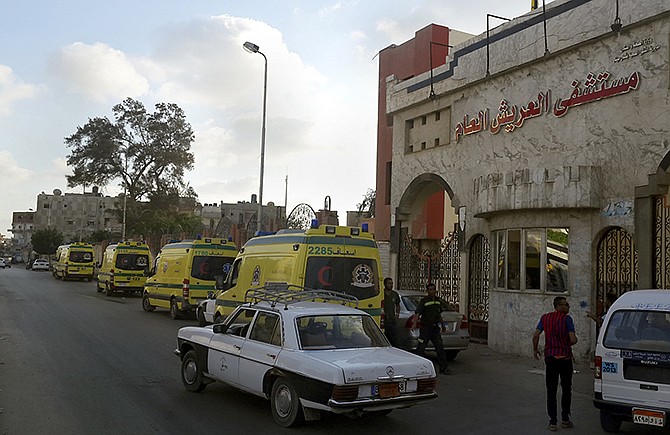EL-ARISH, Egypt (AP) - Dozens of Islamic militants unleashed a wave of simultaneous attacks, including suicide car bombings, on Egyptian army checkpoints in the restive northern Sinai Peninsula on Wednesday, killing at least 64 soldiers, officials said.
The advanced planning and coordinated execution of the attacks show the long-running insurgency in the area is growing stronger, posing a serious threat to Egypt's security as the military-backed government struggles to restore stability after years of unrest since the 2011 uprising.
The assault came a day after Egypt's President Abdel-Fattah el-Sissi pledged to step up the battle against Islamic militants and two days after the chief prosecutor was assassinated in the capital, Cairo. The officials said 90 militants were killed in fierce fighting that started in the early morning and raged until the end of the day - the deadliest battle in Sinai since the 1973 Arab-Israeli war.
Later Wednesday, a special forces team killed nine members of the outlawed Muslim Brotherhood, including a former member of parliament, in a raid on an apartment in Cairo's Sixth of October district, security officials said. The team was fired upon when they entered the home and returned fire, killing the nine men. No security forces were wounded, said the officials, who spoke on condition of anonymity because they weren't authorized to brief the press.
One of the dead was Nasr al-Hafi, a former deputy in the lower house of parliament for the Brotherhood's Freedom and Justice party, while the other was a Brotherhood leader, Abdel-Fattah Mohamed Ibrahim.
Egyptian officials and pro-government media have blamed a series of recent attacks on ousted President Mohammed Morsi's Muslim Brotherhood, which is officially branded a terrorist group. The Brotherhood has denied involvement in the attacks, many of which have been claimed by other groups, including the Sinai-based militants behind Wednesday's coordinated assault, who are loyal to the Islamic State group.
The Sinai attacks underscored the resilience of the militants, who have battled Egyptian security forces in northern Sinai for more than a decade but have intensified their insurgency since the 2013 military overthrow of Morsi, even as the military has deployed reinforcements, imposed strict curfews and demolished homes and tunnels along the border with Hamas-ruled Gaza.
The Islamic State affiliate claimed Wednesday's attacks, saying its fighters targeted 15 army and police positions and staged three suicide bombings, two that targeted checkpoints and one that hit an officers' club. The claim's authenticity could not be immediately verified but it was posted on a Facebook page associated with the group.
The assault focused on the town of Sheikh Zuweid and targeted at least six military checkpoints, the officials said. The militants also took soldiers captive and seized weapons and several armored vehicles, they added, speaking on condition of anonymity in line with regulations.
The officials said scores of militants were besieging Sheikh Zuweid's main police station, shelling it with mortars and rocket-propelled grenades and exchanging fire with dozens of policemen inside.
At least 55 soldiers were wounded, the officials said. As fighting raged, an army Apache gunship destroyed one of the armored carriers captured by the militants as they were driving away, the officials said.

